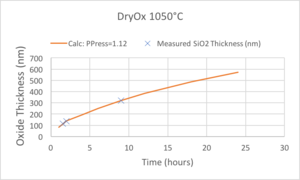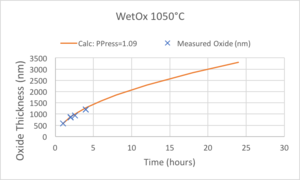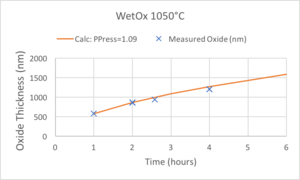Difference between revisions of "Thermal Processing Recipes"
m (→Simulation Parameters: clarified partial pressure is from curve fitting) |
m (More accurate description of how partial pressure derived) |
||
| Line 15: | Line 15: | ||
===== Simulation Parameters ===== |
===== Simulation Parameters ===== |
||
| − | * Partial Pressure = 1.12 ( |
+ | * Partial Pressure = 1.12 (best fit to measured data below) |
* <100>, 1050°C, 10Å Native Oxide, no dopants |
* <100>, 1050°C, 10Å Native Oxide, no dopants |
||
[[File:TyStar_Thermal_Oxidations_-_DryOx_1050°C_2018-04-09.png|alt=plot of Measurements and Curve-Fitting for 1050°C Dry oxidations.|none|thumb|300x300px|'''Measurements and Curve-Fitting for 1050°C Dry oxidations. Note: three data points only.''']] |
[[File:TyStar_Thermal_Oxidations_-_DryOx_1050°C_2018-04-09.png|alt=plot of Measurements and Curve-Fitting for 1050°C Dry oxidations.|none|thumb|300x300px|'''Measurements and Curve-Fitting for 1050°C Dry oxidations. Note: three data points only.''']] |
||
| Line 25: | Line 25: | ||
===== Simulation Parameters ===== |
===== Simulation Parameters ===== |
||
| − | * Partial Pressure = 1.09 ( |
+ | * Partial Pressure = 1.09 (best fit to measured data below) |
* <100>, 1050°C, 10Å Native Oxide, no dopants |
* <100>, 1050°C, 10Å Native Oxide, no dopants |
||
{| |
{| |
||
Revision as of 23:04, 30 May 2019
Tystar 8300
Thermal Oxidation of Silicon - Calculating Oxidation Times
Online calculators for thermal oxidation can be used to estimate the oxidation time for a desired oxidation thickness. Please see the Calculators + Utilities page for links to these oxidation calculators.
Using the Stanford Leland Jr. "Advanced Silicon Thermal Oxide Thickness Calculator", we have determined the following simulation parameters (“partial pressure” in particular) to predict oxidation times. Please note, however, that doping level, impurity concentration and other factors can alter these calibrations, so you may need to calibrate the Partial Pressure yourself if you need higher accuracy.
Thermal Oxidation Recipes
1050°C Dry Oxidation
- Recipe Name: DRY1050
- Tube #2 for Cleaned Silicon Only
- Tube #3 for processed silicon or other anneals.
Simulation Parameters
- Partial Pressure = 1.12 (best fit to measured data below)
- <100>, 1050°C, 10Å Native Oxide, no dopants
1050°C Wet Oxidation
- Recipe Name: WET1050
- Tube #2 for Cleaned Silicon Only
- Tube #3 for processed silicon or other anneals.
Simulation Parameters
- Partial Pressure = 1.09 (best fit to measured data below)
- <100>, 1050°C, 10Å Native Oxide, no dopants
AlGaAs Oxidation
A recipe is available on Tube #1 for thermal oxidation of AlGaAs layers, at much lower temperatures than Tubes #2 & #3. There are special procedures for running this lower-temp. oxidation at shorter times, please contact Tony Bosch or the NanoFab process Group for more information.
Wafer Substrate Bonding
Direct Bonding
Numerous research groups perform direct wafer bonding (of various materials) using either the Suss Wafer Bonder, or a custom graphite fixture in conjunction with any one of numerous ovens, such as the N2-purged Wafer Bonding Furnace (with glove box) or N2-purged Blue M oven or HeraTherm oven.
Il addition, the Fine-Tech Flip-Chip Bonder can perform aligned bonding of various-sized pieces. The Fine-Tech can do metal-to-metal thermo-compression bonding with ultrasonic assist.
The EVG Plasma Activation system and Goniometer allow for surface prep/inspection prior to bonding.
Bonding with Intermediate layer
The Logitech Bonder allows wafer-bonding with a CrystalBond wax intermediate layer. Please see Don Freeborn for recipes.
Tube Furnace AlGaAs Oxidation (Lindberg)
Oxidation of AlGaAs (high-Aluminum content >90%) is performed in this furnace, at temperatures between 200°C → 500°C.
Maximum time is about 3 hours before the bubbler water temperature becomes uncontrolled.
Recipes are available, please ask the NanoFab Process group staff.
Rapid Thermal Processor (SSI Solaris 150)
| To Do: Add starting recipes for RTP |


